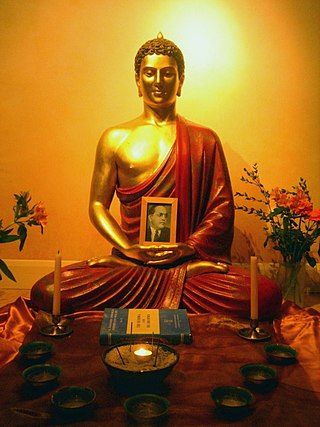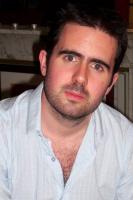Related Research Articles

Sarvepalli Radhakrishnan, natively Radhakrishnayya, was an Indian philosopher and statesman. He served as the second president of India from 1962 to 1967. He was also the first vice president of India from 1952 to 1962. He was the second ambassador of India to the Soviet Union from 1949 to 1952. He was also the fourth vice-chancellor of Banaras Hindu University from 1939 to 1948 and the second vice-chancellor of Andhra University from 1931 to 1936.
Julius Lipner, who is of Indo-Czech origin, is Professor of Hinduism and the Comparative Study of Religion at the University of Cambridge.
Roderick Ninian Smart was a Scottish writer and university educator. He was a pioneer in the field of secular religious studies. In 1967 he established the first department of religious studies in the United Kingdom at the new University of Lancaster where he was also Pro-Vice-Chancellor, having already chaired one of the largest and most prestigious departments of theology in Britain at the University of Birmingham. In 1976, he became the first J.F. Rowny Professor in the Comparative Study of Religions at University of California, Santa Barbara. Smart presented the Gifford Lectures in 1979–80. In 1996, he was named the Academic Senate's research professor, the highest professorial rank at UC Santa Barbara. In 2000, he was elected president of the American Academy of Religion, while simultaneously retaining his status as president of the Inter Religious Federation for World Peace. Smart held both titles at the time of his death.

Richard Bevan Braithwaite was an English philosopher who specialized in the philosophy of science, ethics, and the philosophy of religion.
Klaus K. Klostermaier is a Catholic priest and scholar of Hinduism, Indian history and culture.
Paul Williams is Emeritus Professor of Indian and Tibetan Philosophy at the University of Bristol, England. Until his retirement in 2011 he was also director for the University's Centre for Buddhist Studies, and is a former president of the UK Association for Buddhist Studies.

Navayana means "new vehicle" and refers to the re-interpretation of Buddhism by Bhimrao Ramji Ambedkar; it is also called Neo-Buddhism and Ambedkarite Buddhism. Ambedkar was a polymath, theologian and scholar of Buddhism. He was born in a Dalit (untouchable) family during the colonial era of India, studied abroad, became a Dalit leader, and announced in 1935 his intent to convert from Hinduism to a different religion, and he has studied all the major religions of the world in depth, including Hinduism, Islam, Christianity, Sikhism, and Buddhism, for nearly 21 years. Thereafter Ambedkar studied texts of Buddhism, found several of its core beliefs and doctrines such as Four Noble Truths and "non-self" as flawed and pessimistic, then re-interpreted these into what he called "new vehicle" Buddhism, or Navayana. Ambedkar held a press conference on 13 October 1956, announcing his rejection of Theravada and Mahayana Buddhism, as well as of Hinduism. Thereafter, he left Hinduism and adopted Navayana, about six weeks before his death. Its adherents see Navayana Buddhism not as a sect with radically different ideas, but rather as new movement founded on the principles of Buddhism.
Richard Francis Gombrich is a British Indologist and scholar of Sanskrit, Pāli, and Buddhist studies. He was the Boden Professor of Sanskrit at the University of Oxford from 1976 to 2004. He is currently Founder-President of the Oxford Centre for Buddhist Studies. He is a past president of the Pali Text Society (1994–2002) and general editor emeritus of the Clay Sanskrit Library.
Graham John Ward is an English theologian and Anglican priest who has been Regius Professor of Divinity at the University of Oxford since 2012. As Regius Professor, he is ex officio a member of the College of Canons and Cathedral chapter of Christ Church, Oxford. He is a priest of the Church of England and was formerly the Samuel Ferguson Professor of Philosophical Theology and Ethics and the Head of the School of Arts, Histories and Cultures at the University of Manchester. Previous to that he was the Professor of Contextual Theology and Ethics (1998–2009) and Senior Fellow in Religion and Gender (1997–98) at the university.
Roberto Rino Magliola is an Italian-American academic specializing in European hermeneutics and deconstruction, comparative philosophy, and inter-religious dialogue. He is retired from National Taiwan University and Assumption University of Thailand.

Ravi M. Gupta, also known as Radhika Ramana Dasa, is a notable Vaishnava scholar, author, and editor. Gupta holds the Charles Redd Chair of Religious Studies at Utah State University, and serves as director of its Religious Studies program. He is a member of the International Society for Krishna Consciousness.

Donald Allen Crosby is an American theologian who is Professor Emeritus of Philosophy at Colorado State University, since January 2000. Crosby's interests focus on metaphysics, American pragmatism, philosophy of nature, existentialism, and philosophy of religion. He is a member of the Highlands Institute of American Religious and Philosophical Thought (HAIRPT) and has been a leader in the discussions on Religious Naturalism.
Carool Kersten is a Dutch scholar of Islam and the author and editor of eleven books. Trained as an Arabist, Southeast Asianist and scholar of Religions, he currently is Professor of Islamic Studies at the Catholic University Leuven in Belgium and Emeritus Reader in the Study of Islam & the Muslim World at King's College London. His research interests focus on the modern and contemporary Muslim world, in particular political and intellectual developments in both regional and global contexts.

David William Brown is an Anglican priest and British scholar of philosophy, theology, religion, and the arts. He taught at the universities of Oxford, Durham, and St. Andrews before retiring in 2015. He is well-known for his "non-punitive theory of purgatory, his defense of specific versions of social Trinitarianism and kenotic Christology, his distinctive theory of divine revelation as mediated fallibly through both tradition and imagination, and his proposals regarding a pervasive sacramentality discerned in nature and human culture alike."
Dr. Jens Michael Zimmermann is a German-Canadian Christian philosopher, theologian, and professor who specializes in hermeneutics and the philosophical and theological roots of humanism.
Carl A. Raschke is an American philosopher and theologian. Raschke is a Past Chair and Professor of Religious Studies Department at the University of Denver, specializing in continental philosophy, the philosophy of religion and the theory of religion. He was given the university lecturer award for 2020-2021. He is also listed with the affiliated faculty of the Global Center for Advanced Studies.
Simon Andrew Oliver is a British Anglican priest, theologian, and academic. He was formerly Associate Professor of Philosophical Theology at the University of Nottingham, he is now the Van Mildert Professor of Divinity at the University of Durham. Oliver is also on staff with the Centre of Theology and Philosophy.

Tom Greggs FRSE is a British theologian and the Marischal Professor of Divinity at the University of Aberdeen.

Stephen Richard Palmquist is an American philosopher, currently living in Los Angeles. He taught philosophy at various universities in Hong Kong from 1987 to 2021. A Patheos article referred to him as "one of the greatest living interpreters of Kant".
References
- 1 2 3 4 "Professor Richard King". Religious Studies. University of Kent. Retrieved 10 June 2017.
- 1 2 "Richard King". Critical Studies Staff. Wayback Machine. Archived from the original on July 11, 2012. Retrieved 7 March 2013.
- ↑ "Guggenheim: Books". Books. Guggenheim Publications. Retrieved 7 March 2013.